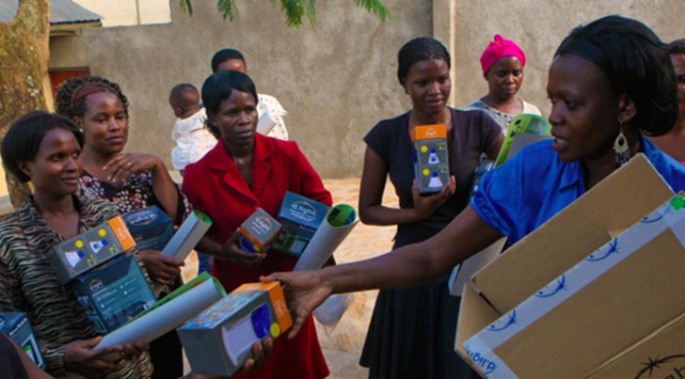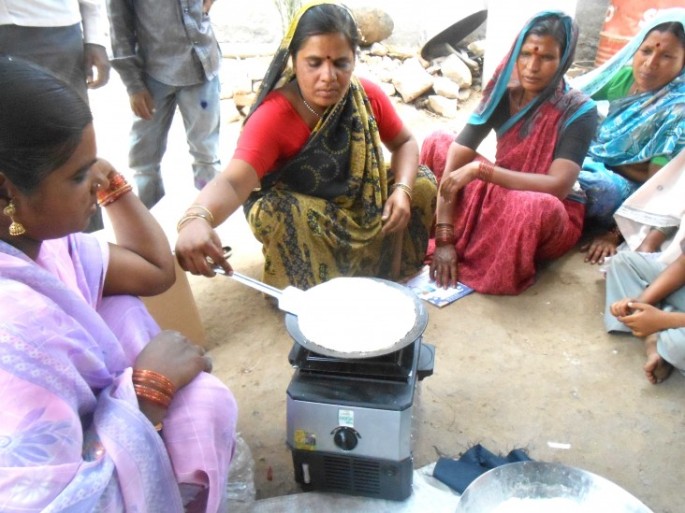The burden of energy poverty falls heavily upon the shoulders of women.
Lack of access to energy means that women are forced to rely on harmful, inefficient, and expensive sources of cooking, heating, and lighting.
Fortunately, these same women are the keys to eliminating energy poverty, spurring economic growth, and combating climate change.
The simple truth is that our hope for a low-carbon future lies in the hands of women entrepreneurs who can push for the adoption of renewable and sustainable sources of energy in underserved communities.
Here’s the case for women entrepreneurs in clean energy.

Energy Stats
- 1.2 billion people have no access to electricity; 620 million of them live in Sub Saharan Africa.
- 38% of the world’s population (2.7 billion people) relies on traditional and inefficient forms of cooking and heating.
- Household air pollution results in the deaths of 600,000 Africans yearly, with half of the deaths being children under the age of 5.

Image: factsreports.revues.org
- Women spend an average of 5 hours each day looking for fuel for cooking; charcoal, firewood, biomass.
- The informal energy market in Kenya is worth $320 million; revenue that is not taxed by the government.
- 25% of black carbon (which causes climate change) is as a result of inefficient lighting and cooking practices.
- Africa’s poorest households pay some of the highest prices for energy in the world as a result of cost barriers which prevent access to efficient, affordable, and renewable sources of energy.
‘We estimate that the 138 million households comprising people living on less than US$2.50 a day are spending US$10 billion annually on energy-related products, such as charcoal, candles, kerosene and firewood…a woman living in a village in northern Nigeria spends around 60 to 80 times per unit more for her energy than a resident of New York City or London.’ – African Progress Report
- Shortages and disruptions in the formal energy sector cost Sub-Saharan Africa 2-4% of its annual GDP, which impacts development and jobs.
- Current trends say that ‘it will take until 2080 for every African to have access to electricity’ and that ‘universal access to non-polluting cooking will not happen until the middle of the 22nd century.’
Why Women?
The push for universal access to clean energy needs to be a collaborative effort that includes both men and women.
Then why are we discussing a gender-informed approach to tackling this issue as opposed to outlining a gender-inclusive plan?

Image: Inhabitat.com
Firstly, women are unduly affected by energy poverty i.e. spending hours collecting and carrying fuel for their household, getting sick from air pollution caused by burning said fuels, and carrying out household tasks in poorly lit environments.
The reality is, when it comes to household responsibilities gender stereotypes very much apply, and the only way to ensure wide scale adoption of clean energy technologies is to incorporate primary users into the value chain.
“There is little doubt that energy poverty is one of the most important challenges facing women in the 21st century…yet women are the primary users and often producers of energy and so without their direct involvement, clean energy technologies and initiatives like wPOWER are at risk of not reaching their intended populations or use”– Dr. Linda Davis of wPOWER.
Moreover, women are often part of women’s networks. Tapping into these networks is vital in increasing awareness of clean energy alternatives, educating women on product features and advantages, discussing the health benefits of clean energy, informing households of quality clean energy brands, and promoting financial independence through micro-enterprise.

Image: nigeriacleancooking.org
When we look at the entrepreneurship portion of clean energy, research has shown that women in Kenya outsell men 3:1 and that women with savings will invest 45% more than men into their business. Clearly women are more effective in selling clean energy technology within their communities.

Image: inhabitat.com
In regards to economy and empowerment, women are known to invest their income into their family, their children’s education, and their business.
Putting women at the forefront of clean energy entrepreneurship is therefore necessary for clean energy adoption, clean energy advocacy, and economic growth.

Image: inhabitat.com
Challenges Faced by Women in Clean Energy
While women can bridge the gap between the demand and supply of affordable, renewable, and safe energy solutions, the journey is not easy.
Firstly, many large companies research, design and produce technology without input from the communities they target, only involving end users during the distribution phase. What we have now is communities receiving technology that is inefficient, of poor quality, and unsuitable for their needs.
It is imperative for women to be integrated into every step of research, design, production, and retail, as they have crucial perspective into what works and what doesn’t. We cannot expect clean energy initiatives to be adopted if the options are limited to a few ‘okay’ technologies that do not work for the people who are meant to use them.

Image: europa.eu
In addition, many women in poor communities lack the technical skills, financial and legal literacy, and business training to be effective entrepreneurs. Thankfully, skill can be learned, and it is up to industry players to provide information, comprehensive training, practical tools, and mentorship to potential entrepreneurs.
Once women learn how to sell to their market and grow their business, they can optimize sales and increase the adoption of clean energy technology.
Yet another issue that women face is access to financial support. Many women in underserved communities are not primary breadwinners or landowners, and therefore have no savings to invest or assets to leverage for loans.
Linking women with financial institutions that offer innovative microfinance solutions allows them to go forward with their entrepreneurial endeavours.
Advocating on behalf of women entrepreneurs in clean energy will also swing public policy their way, thereby empowering women within their own communities while eliminating the socio-cultural barriers that restrict women’s involvement in entrepreneurship.

Image: usaid.gov
It should also be noted that while there is a lot of data (case studies & best practices) that supports the effectiveness of women in clean energy, this data is rarely collated and presented. It is crucial for industry players to consolidate and share their research, allowing for a better understanding of the role women play in clean energy.
When you understand this data better, you can make informed decisions, reduce gender barriers, and tailor energy policy to support women.
wPOWER (Partnership on Women’s Entrepreneurship in Renewables)
Two weeks ago I attended a business talk by Dr. Linda Davis of wPOWER: a ‘U.S. Department of State funded project that works to promote the role of women in clean energy entrepreneurship and in addressing climate change.’
Their mission is to ‘empower 8,000 women in clean energy entrepreneurship to deliver clean energy access to 3.5 million people globally’, which they are pursuing through building evidence, sharing best practices, and advocacy.
Over the last few years their actions have resulted in:
- 4,717 women and youth trained
- 2,221,195 people with improved access to clean energy technologies
- 96,493 Green House Gas reduction in tonnes.
Watch this lovely video for a better understanding of how wPOWER Hub has achieved so much in just a few years:
This is just one organization of many that has proven that promoting women in clean energy entrepreneurship is an effective strategy for fighting energy poverty and combating climate change.
While monetary donations have helped push the clean energy agenda, sustainable clean energy adoption can only be achieved if women are given the tools to set up small scale businesses.
By shaping policies that promote the role of women in this industry, energy-poor communities can benefit from the adoption of clean energy technologies.
The time is now for clean energy companies, governments, financial institutions, donor backed programs, and local communities to come together to ensure that women are weaved into the fabric of clean energy initiatives if we expect to see the end of energy poverty and a future with renewable and sustainable energy.
How can you contribute to energy programs in your community?

Reblogged this on Godfrey Sanga – Energy Development Consultant and commented:
In addition to the resources-based empowerment – i.e. the provision of external support to women entrepreneurs such as market opportunities, business financing, knowledge and skill building or education, it is equally important to foster internal aspects such as such as self-esteem, personal power, reflective thinking to increase one’s capacity to take decisions and act towards one’s goals. This kind of empowerment focuses on fostering internal support- the psychological state that is necessary to enhance women entrepreneurs’ ability to formulate strategic choices and to control resources and decisions that affect their life outcomes.
This is from my experience in gender mainstreaming in energy projects and recent projects that I am involved with in partnership with the wPOWER.
LikeLike
You’re 100% right; without internal support women entrepreneurs would be unable to meet their goals, even with the right resources.
It’s great to hear of your work in the field and I hope to meet you some day.
Thanks for commenting and sharing my article.
LikeLike